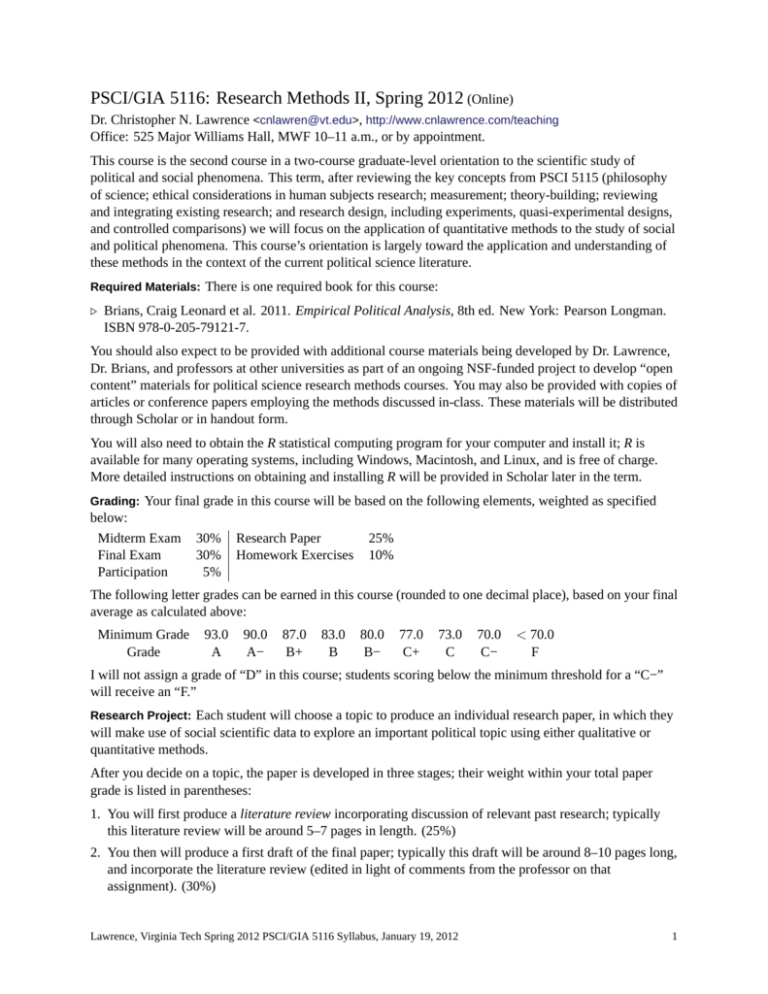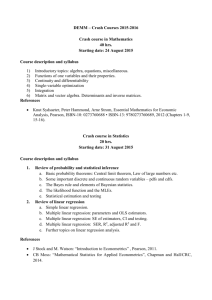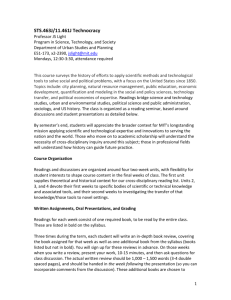
PSCI/GIA 5116: Research Methods II, Spring 2012 (Online)
Dr. Christopher N. Lawrence <cnlawren@vt.edu>, http://www.cnlawrence.com/teaching
Office: 525 Major Williams Hall, MWF 10–11 a.m., or by appointment.
This course is the second course in a two-course graduate-level orientation to the scientific study of
political and social phenomena. This term, after reviewing the key concepts from PSCI 5115 (philosophy
of science; ethical considerations in human subjects research; measurement; theory-building; reviewing
and integrating existing research; and research design, including experiments, quasi-experimental designs,
and controlled comparisons) we will focus on the application of quantitative methods to the study of social
and political phenomena. This course’s orientation is largely toward the application and understanding of
these methods in the context of the current political science literature.
Required Materials: There is one required book for this course:
. Brians, Craig Leonard et al. 2011. Empirical Political Analysis, 8th ed. New York: Pearson Longman.
ISBN 978-0-205-79121-7.
You should also expect to be provided with additional course materials being developed by Dr. Lawrence,
Dr. Brians, and professors at other universities as part of an ongoing NSF-funded project to develop “open
content” materials for political science research methods courses. You may also be provided with copies of
articles or conference papers employing the methods discussed in-class. These materials will be distributed
through Scholar or in handout form.
You will also need to obtain the R statistical computing program for your computer and install it; R is
available for many operating systems, including Windows, Macintosh, and Linux, and is free of charge.
More detailed instructions on obtaining and installing R will be provided in Scholar later in the term.
Grading: Your final grade in this course will be based on the following elements, weighted as specified
below:
Midterm Exam
Final Exam
Participation
30%
30%
5%
Research Paper
Homework Exercises
25%
10%
The following letter grades can be earned in this course (rounded to one decimal place), based on your final
average as calculated above:
Minimum Grade
Grade
93.0
A
90.0
A−
87.0
B+
83.0
B
80.0
B−
77.0
C+
73.0
C
70.0
C−
< 70.0
F
I will not assign a grade of “D” in this course; students scoring below the minimum threshold for a “C−”
will receive an “F.”
Research Project: Each student will choose a topic to produce an individual research paper, in which they
will make use of social scientific data to explore an important political topic using either qualitative or
quantitative methods.
After you decide on a topic, the paper is developed in three stages; their weight within your total paper
grade is listed in parentheses:
1. You will first produce a literature review incorporating discussion of relevant past research; typically
this literature review will be around 5–7 pages in length. (25%)
2. You then will produce a first draft of the final paper; typically this draft will be around 8–10 pages long,
and incorporate the literature review (edited in light of comments from the professor on that
assignment). (30%)
Lawrence, Virginia Tech Spring 2012 PSCI/GIA 5116 Syllabus, January 19, 2012
1
3. Finally you will produce a final version of the paper, typically 10–12 pages in length, incorporating
revisions based on the professor’s comments on your draft. (45%)
Each stage of the paper will be an element of the research project grade. The “new” material in each
subsequent draft of a paper will generally be graded more leniently than material that was expected to be
revised in the more complete draft. You should expect substantially greater grade reductions for problems
that remain uncorrected after being pointed out to you in subsequent drafts of a paper, even if the penalties
for those problems were relatively light in the initial draft where the problems appeared.
This research project may be part of your own thesis research, if you choose; you may also build on the
research design paper you wrote for PSCI/GIA 5115 last term, if you like.
Students should expect that their draft and final papers will be graded using a course rubric; a copy of this
rubric will be posted on Scholar for your reference. Further details on what each stage of the project entails
will be discussed later in the term.
Each student will also be expected to read and comment on the various stages of two other students’ papers.
These comments will be shared with both the author of the paper and the instructor.
Participation: 5% of your grade will be based on your level of participation in class. This will be evaluated
holistically by the professor.
Class Policies: As this course is a seminar, it is your responsibility to have completed the readings and to
be ready to discuss them with your fellow students. I realize that many of you have daytime employment
and/or other obligations, but that does not relieve you of the responsibility to devote out-of-class time to
this course. While I, as the professor, will often lead the discussion, or elaborate on particular readings and
themes, you are expected to contribute to the success of the class as well.
As graduate students, you are solely responsible for your own performance in the course. I am always
happy to meet with (in person or via online conferencing) students to discuss their concerns about the
course, but I will not necessarily assume that you are in difficulty simply because you perform poorly on an
assignment or disappear from the discussion.
This syllabus is subject to revision by the professor.
Late Work: A late penalty of up to 5 percentage points per day will apply to work turned in after the
deadline for the assignment.
To encourage you to treat the research paper as a cumulative product, you will not receive credit for turning
in an earlier stage of the research paper based on submitting a later stage of the paper (for example, turning
in the research paper draft will not entitle you to credit for the literature review), nor will you receive any
credit for a stage of the paper that is turned in within four days of the due date for the next stage of the paper.
No assignments will be accepted for credit after 12 p.m. (noon) on the day following the final examination
for this course, except under extraordinary circumstances justifying the assignment of an Incomplete grade.
Grade Appeals: If you wish to dispute a grade on a particular assignment for any reason other than an
obvious arithmetic error on my part, you will need to type a one-page explanation of your position and turn
it in, along with the original graded assignment, at least one week after the assignment is returned to you. I
will then consider your appeal and make a determination.
For appeals regarding your final grade in the course, please consult the Student Handbook and Catalog for
procedures.
University and College Policies: A grade of incomplete (“I”) is assigned only to a student who is
otherwise passing the class and only in cases of unavoidable or unforeseen circumstances (e.g., major
Lawrence, Virginia Tech Spring 2012 PSCI/GIA 5116 Syllabus, January 19, 2012
2
illness) preventing a student from completing the course requirements. Verifiable documentary evidence is
required.
Any student who feels that he or she may need an accommodation because of a disability (e.g., learning
disability, attention deficit disorder, psychological, physical, etc.) should make an appointment to see the
professor during or outside of office hours; in general, accommodations will be made based on the written
recommendations of the Services for Students with Disabilities Office (540-231-0858 or
http://www.ssd.vt.edu/).
To maintain a fair and untainted learning environment for all students, there must be no cheating,
plagiarism, or other dishonest conduct, as defined by Virginia Tech policy. Each of these terms is defined
in the Virginia Tech Honor Code (http://www.honorsystem.vt.edu/). Each and every graded assignment shall
include a statement attesting that the work was performed by the student in question; the your submission
of an assignment via email or the Scholar drop box implies that it is your own work. All course work must
be completed solely by the individual student, unless specifically identified in writing as a group project by
your professor. Any violations of the honor code will be fully reported. Recommendations regarding
avoiding plagiarism and citing others’ work are included in the course handout on plagiarism (posted in
Scholar and on the professor’s website).
Withdrawal Deadlines: The course drop deadline is Monday, February 27th. The deadline for resignation
(dropping all courses) is Monday, March 19th. The last day to apply for a “W” grade is Friday, April 27th.
Lawrence, Virginia Tech Spring 2012 PSCI/GIA 5116 Syllabus, January 19, 2012
3
Course Outline: Any changes to this schedule will be posted in Scholar. We will not necessarily read
books in the order they appear on the syllabus; please be sure you read the correct chapters in advance of
the designated class dates.
While the professor may periodically remind students of upcoming scheduled events, it is your
responsibility to be familiar with this schedule and any changes to it.
Jan 17–20 Introduction to the course.
Reading: Brians et al., ch. 1.
Jan 23–27 What is science? How can we study the social world scientifically? Why use a scientific approach?
Reading: Brians et al., ch. 2.
Jan 30–Feb 3 Review of research design and measurement.
Reading: Brians et al., ch. 4–5.
Feb 6–10 Review of experimental design and sampling.
Reading: Brians et al., ch. 6–7.
Feb 13–17 Review of univariate statistics.
Reading: Brians et al., ch. 16.
Feb 20–24 Review of bivariate statistics (t, χ2 tests).
Reading: Brians et al., ch. 17.
Feb 27–Mar 2 Introducing multivariate statistics: correlation and basic regression.
Reading: Brians et al., ch. 18 (part).
Friday, March 2 Literature Review Due, 6 p.m. EDT
Mar 5–9 Spring Break: no assignments.
Mar 12–16 Dummy variables and interactions in regression.
Readings: Brians et al., ch. 18 (part); reserve materials.
Mar 19–23 Regression with binary outcomes: logit and probit models.
Readings: reserve materials.
Mar 26–30 Regression with nominal and ordinal outcomes: ordered logit and probit; multinomial logit.
Readings: reserve materials.
Apr 2–6 Regression with count outcomes: Poisson regression; negative binomial regression.
Readings: reserve materials.
Friday, April 6th Draft Paper Due, 6 p.m. EDT
Apr 9–13 Truncated and censored regression: Tobit regression.
Readings: reserve materials.
Apr 16–20 Simplifying high-dimensional data: principal components analysis and factor analysis.
Readings: reserve materials.
Apr 23–27 Presenting quantitative analyses: using the R xtable and mtable (memisc) packages.
Readings: reserve materials.
Monday, April 30 Final Paper Due, 6 p.m. EST
Apr 30–May 2 Wrap-up. Final examination assigned; due Tuesday, May 8th at 6 p.m. EST.
Lawrence, Virginia Tech Spring 2012 PSCI/GIA 5116 Syllabus, January 19, 2012
4







